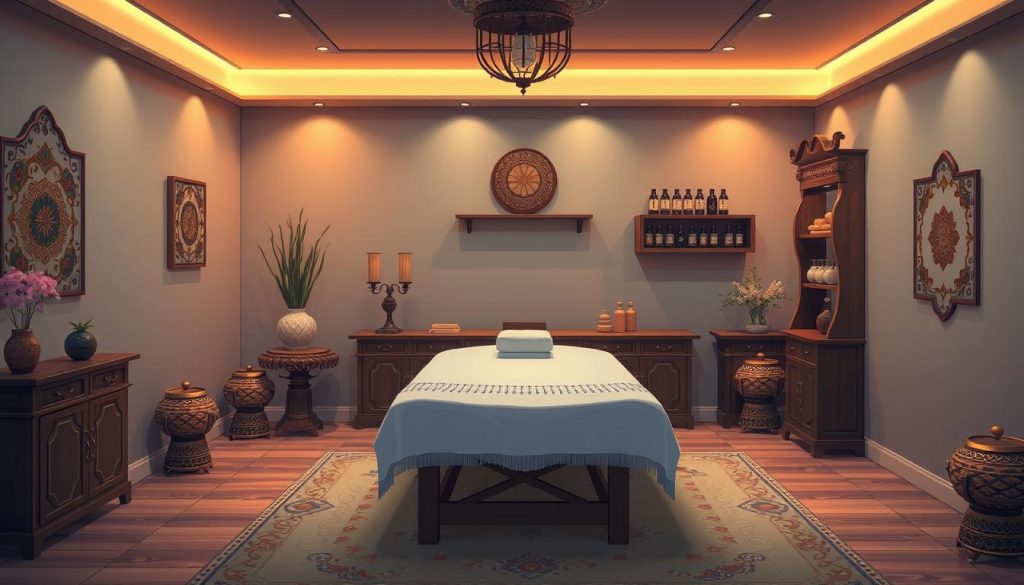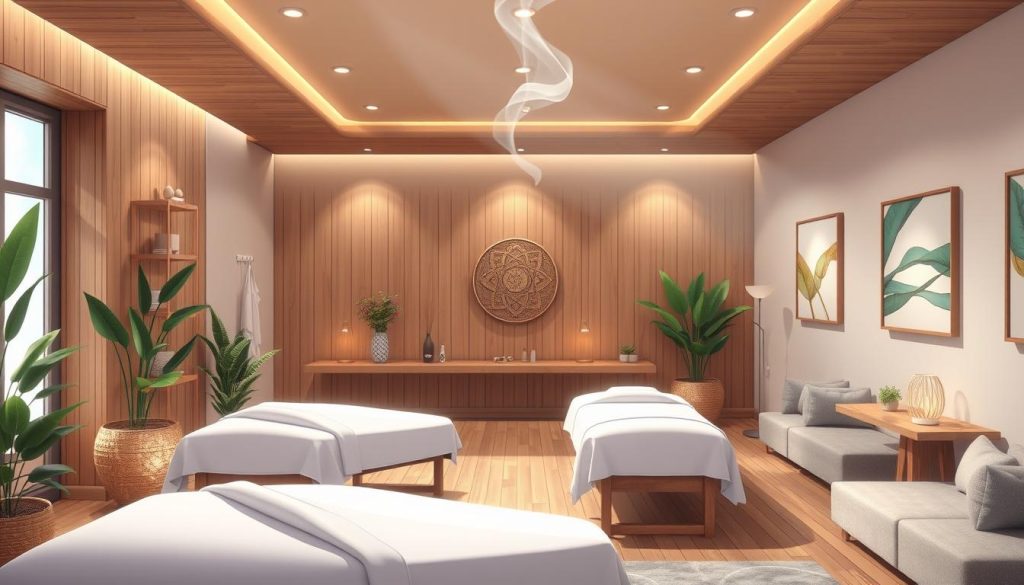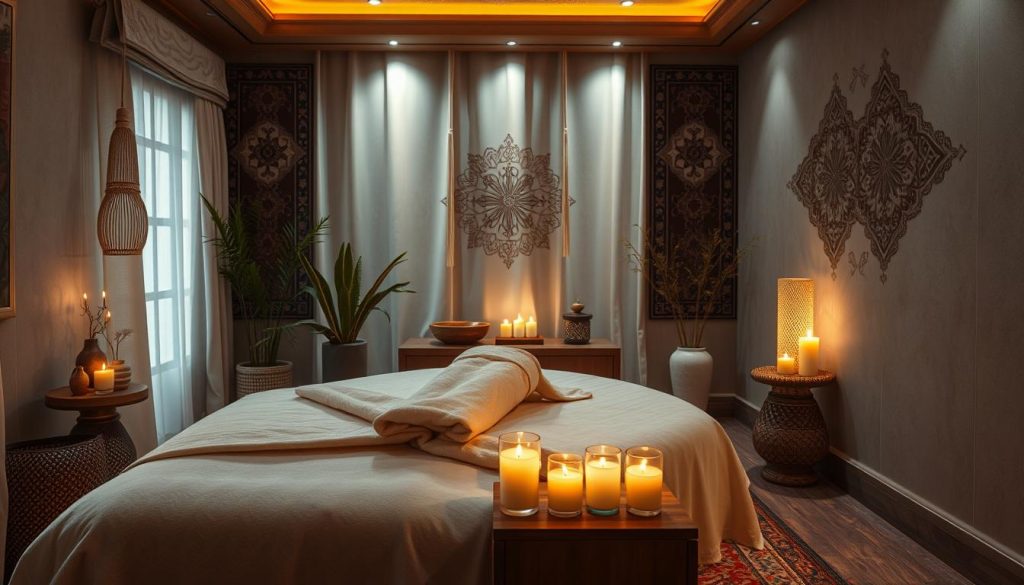Thinking about becoming a masseuse in Turkey? You might wonder what kind of work environment masseuses face. Turkey’s rich culture of traditional Turkish baths, or “hamam,” and the growing need for massage therapists make it a great place to start a career. But, what does it take to excel as a masseuse here?
It’s key to know the legal needs and work standards in the industry. As you start your career as a masseuse in Turkey, you’ll need to think about the conditions and environment. Understanding these will help you thrive in this rewarding field.
Key Takeaways
- Understanding the masseuse work environment is crucial to succeeding as a masseuse in Turkey.
- Turkey has a rich culture of traditional Turkish baths, or “hamam,” which offers a unique and rewarding career path.
- The demand for massage therapists in Turkey is growing, with a focus on lymphatic massage and other specialized techniques.
- Under what conditions do masseuses work? is an essential question to consider when navigating your career as a masseuse in Turkey.
- A comprehensive understanding of the industry, including legal requirements and work environment standards, is necessary for success.
- Continuous education and professional development are vital for masseuses in Turkey, with many therapists specializing in lymphatic drainage techniques and other modalities.
- Good business skills are crucial for success in the massage therapy field, particularly in the first five years of your career.
Understanding the Turkish Massage Therapy Landscape
If you’re a massage therapist, you might wonder about the massage therapist job settings and massage practitioner work environment in Turkey. The country mixes old and new in massage therapy, making it interesting. It combines traditional Turkish massage with modern methods and technology.
In Turkey, massage is big in the wellness tourism world, which is growing. More people worldwide want holistic healing and traditional practices. Places like Istanbul’s traditional Turkish hammams are key, attracting many visitors each year.
- Diverse range of massage services, including deep tissue and Swedish massage
- Prevalence of hydrotherapy in Istanbul spas, with around 40% of wellness centers offering specific hydro-massage treatments
- Fusion of traditional Turkish massages with modern services, emphasizing the blend of heritage with contemporary wellness practices
Knowing about Turkey’s massage therapy scene helps you understand the massage practitioner work environment and massage therapist job settings. This knowledge lets you work well and respect your clients.
Legal Requirements for Masseuses in Turkey
To work as a masseuse in Turkey, you must know the legal rules. You need a work permit, which follows the International Labour Law No. 6375. For more on work permits for foreigners, visit the official website. Massage therapists must work in places that follow certain rules. Employers must show they have at least five Turkish workers for each work permit.
For physical therapy settings, the employer company needs TRY100,000 in capital. The foreign partner must own at least 20% of the company or TRY40,000. Masseuses must earn at least twice the minimum wage.
Here are some key work permit requirements in Turkey:
- Foreign workers can apply for a work permit if they have a valid residence permit for at least 6 months.
- Employers must show they have at least five Turkish citizens for each work permit.
- The employer company needs TRY100,000 in capital.

It’s important to know the legal rules for masseuses in Turkey. Understanding these regulations helps you follow the rules and avoid problems. By learning about the rules for massage therapists and physical therapy settings, you can get a work permit and start your career in Turkey.
Physical Work Environment Standards
As a massage therapist in Turkey, your work environment is key. It must be safe and effective for clients. You need the right equipment and supplies, like massage tables and oils, to do your job well.
Your workplace must meet certain standards. This includes the design and layout of the wellness center workplace. It’s also important to keep the place clean and hygienic. This helps prevent infections and keeps clients trusting you.
Facility Requirements
The wellness center workplace in Turkey must be clean and well-ventilated. Treatment rooms should be private and comfortable. They need enough space for clients to get ready and receive treatment.
Equipment and Supply Standards
For a spa job in Turkey, you need top-notch equipment and supplies. Massage therapists should have access to quality massage tables, oils, and more. Keeping this equipment clean and well-maintained is crucial to prevent infections.
Safety Protocols
Safety is a top priority in a wellness center workplace. Massage therapists should know how to handle emergencies, like CPR and first aid. The center should also have a plan for dealing with client complaints and keeping their information private.
Under What Conditions Do Masseuses Work in Turkish Spas?
Working as a masseuse in a Turkish spa is unique. You’ll be in a massage studio atmosphere that blends old and new. You’ll work with a team, giving massages and body treatments to guests.
As a masseuse, you’ll use tools and products for massages. You’ll also do body treatments like scrubs and wraps. You must always check with guests to make sure they’re comfortable and safe.
Some key tasks for a masseuse in a Turkish spa include:
- Providing massage services and body treatments to clients
- Maintaining a clean and safe working environment
- Checking with guests to promote comfort, safety, and security
- Cleaning and maintaining tools and equipment
Turkish spas look for masseuses with at least 1 year of experience and a massage license. The job is fast-paced and requires lifting and moving heavy objects.
| Responsibility | Description |
|---|---|
| Massage Services | Providing massage services using props and/or products |
| Body Treatments | Providing body treatments involving scrubs, wraps, and hydrotherapy |
| Client Safety | Frequently checking with guests to promote comfort, safety, and security |
Working as a masseuse in a Turkish spa is both rewarding and challenging. It needs technical skills, physical strength, and great customer service.
Professional Standards and Expectations
In Turkey, massage practitioners must meet certain standards. They need the right education, certifications, and ongoing learning. This keeps them up-to-date with new methods and tools. The massage practitioner workplace is a place of professionalism. It demands respect for client privacy and getting their consent before starting a session.
Key aspects of massage work include a clean space, proper draping, and clear communication. Here are some key expectations for massage practitioners in Turkey:
- Maintain a clean and safe environment for clients
- Obtain informed consent before each session
- Respect client boundaries and maintain confidentiality
Massage practitioners in Turkey also need to keep learning. They should go to workshops, seminars, and online courses. This helps them improve their skills and knowledge.

By following these standards, massage practitioners in Turkey can offer top-notch care. They can also keep a good name in the industry. The factors affecting massage work are complex. But, by staying informed, practitioners can overcome these challenges and give the best care to their clients.
| Expectation | Description |
|---|---|
| Maintain a clean and safe environment | Ensure the massage room is clean and safe for clients |
| Obtain informed consent | Obtain consent from clients before each session |
| Respect client boundaries | Maintain confidentiality and respect client boundaries |
Working Hours and Schedules
As a massage therapist in Turkey, your hours can change based on where you work. You might be in a Turkish bath, spa, or wellness center. Each place has its own hours, often from morning to evening, sometimes late at night.
Your schedule might include both day and night shifts. Being flexible and able to work different hours is key. This includes weekends and holidays. Many work part-time for a better life balance but need to be flexible.
A typical week for a massage therapist in Turkey is 35 to 40 hours. Hours can vary based on the job and where you work. Some choose to work as freelancers or start their own businesses. This gives more control over your schedule but requires more effort to manage the business side.
Here are some key points to consider when it comes to working hours and schedules as a massage therapist in Turkey:
- Flexible scheduling to accommodate clients’ needs
- Varying hours, including daytime and evening shifts
- Part-time work options for better work-life balance
- Typical workweek: 35 to 40 hours
- Freelance or business ownership options for more control over schedules
Working hours and schedules for massage therapists in Turkey can vary. It’s important to be adaptable and flexible. This helps meet job demands and provide great service to clients.
Compensation and Benefits Structure
Understanding the compensation and benefits for massage therapists in Turkey is key. The best jobs often mix salary, commission, and benefits. Spas can pay hourly or on a commission basis.
Reports show massage therapists earn about $41,900 a year on average. But pay can change based on location, experience, and spa type. Some spas add benefits like health insurance and paid time off to the package.

Commission systems vary among spas. Some pay a percentage of the treatment price, others a fixed amount. For example, a therapist might get 10% to 20% of the price. Bonuses or incentives can also be part of the deal.
When looking at jobs, consider the whole compensation and benefits package. The best places offer fair pay, growth chances, and a supportive work environment. Knowing what’s included helps therapists choose and negotiate better jobs.
Health and Safety Protocols
As a massage therapist in Turkey, you must know the health and safety rules. These rules help keep you and your clients safe. They include good hygiene, using protective gear, and keeping a safe distance in massage therapist work settings and physical therapy settings.
Some important rules to follow are:
- Wash your hands often, especially between clients, to stop germs from spreading
- Make sure to have enough time between clients for cleaning
- Clean all surfaces that clients might touch before the next client
- Try to touch only clean surfaces to lower germ risk
Good air flow is also key. Using air purifiers and dehumidifiers can make the air cleaner and more comfortable in massage therapist work settings and physical therapy settings. Don’t work too long hours. Working too much can lower your service quality and increase safety risks.
Setting regular work hours helps keep a good balance between work and life. This balance is important for safety for both clients and therapists. By sticking to these rules, you can avoid accidents and keep everyone safe in massage therapist work settings and physical therapy settings.
| Protocol | Importance |
|---|---|
| Hand washing | High |
| Surface cleaning | High |
| Proper ventilation | Medium |
| Regular working hours | Medium |
Client Interaction Guidelines
Working as a massage therapist in a spa job means knowing how to interact with clients well. In a wellness center workplace, building a professional relationship with clients is key. This helps keep clients coming back and referring others.
Starting conversations with clients before the massage is important. It sets the stage for a strong connection. About 90% of clients like it when their massage is tailored to their needs.
Respecting clients’ personal space is crucial. It makes 85% of clients feel more at ease. Also, 60% of clients want tips on self-care after their massage. Giving them advice can make them happier.
To learn more about interacting with massage clients, check out The Professional Massage Academy website. By following these tips, massage therapists can make their clients happy. This leads to more clients staying and referring others.

- Establishing clear boundaries and expectations
- Providing personalized services and treatment plans
- Respecting physical boundaries and maintaining client trust
- Offering self-care tips and exercises post-session
By sticking to these guidelines, massage therapists can offer a great experience. This makes clients happy and keeps them coming back to a spa job or wellness center workplace.
Career Growth Opportunities
As a massage therapist in Turkey, you have many career paths to explore. You can move into advanced specializations or take on management roles. The massage practitioner workplace
The health benefits of massage therapy are becoming more known. This, along with an aging population and a need for non-invasive treatments, boosts your earning potential. Some massage therapists even make over six figures.
Advanced Specializations
You can specialize in areas like sports massage, deep tissue massage, or myofascial release. These specializations can make you more money and bring you joy in your work.
Management Positions
With more experience and education, you can become a spa manager or director of a massage program. These roles offer chances to grow your career and develop leadership skills.
The career growth for massage therapists in Turkey is promising. There’s a rising need for services and more people seeing the health benefits of massage.
Work-Life Balance Considerations
Being a massage therapist in Turkey means finding a good balance between work and life. The massage studio atmosphere can be tough, both physically and emotionally. It’s key to take care of yourself and relax.
Doing things you love and staying healthy are important. This helps you enjoy your job more and feel better overall.
Working as a masseuse can lead to muscle pain and injuries. This is because the job is physically demanding. Taking breaks and doing exercises like yoga can help.
Here are some tips for better work-life balance:
- Set clear work hours and see fewer clients each day.
- Make time for yourself to relax and recharge.
- Do things outside of work that make you happy and reduce stress.
Getting a good work-life balance is crucial for any job. As a massage therapist in Turkey, remember to relax and take care of yourself. This way, you can have a rewarding and lasting career in the massage studio atmosphere and employment settings for masseuse.
Common Challenges and Solutions
Working as a massage therapist in Turkey comes with its own set of challenges. You might face physical demands, emotional stress, and issues with professional boundaries. It’s key to manage your health, find ways to cope, and keep professional lines clear to offer safe and effective services.
In a typical massage practitioner workplace, dealing with clients’ varied needs and expectations can be tough. But, with the right training, communication, and boundaries, you can deliver top-notch service and gain a loyal client base.
Massage therapists often struggle with physical strain, musculoskeletal injuries, and emotional stress. To tackle these, self-care, effective coping strategies, and a healthy work-life balance are crucial.
By understanding these challenges and taking steps to address them, you can build a positive and supportive setting for massage therapy. This approach can lead to a rewarding career as a massage therapist in Turkey, with a well-organized massage practitioner workplace.
Conclusion: Building a Successful Massage Therapy Career in Turkey
Starting your massage therapy career in Turkey? Success isn’t just about knowing how to massage. It’s also about understanding the local culture and professional standards. Learn about the working conditions, rules, and what clients expect. This will help you build a rewarding career.
Decide if you want to focus on traditional Turkish massage or modern techniques. Being aware of the work environment and meeting client needs is crucial. Keep learning, improve your communication, and focus on building strong client relationships. This will make your career as a massage therapist in Turkey both fulfilling and lasting.






